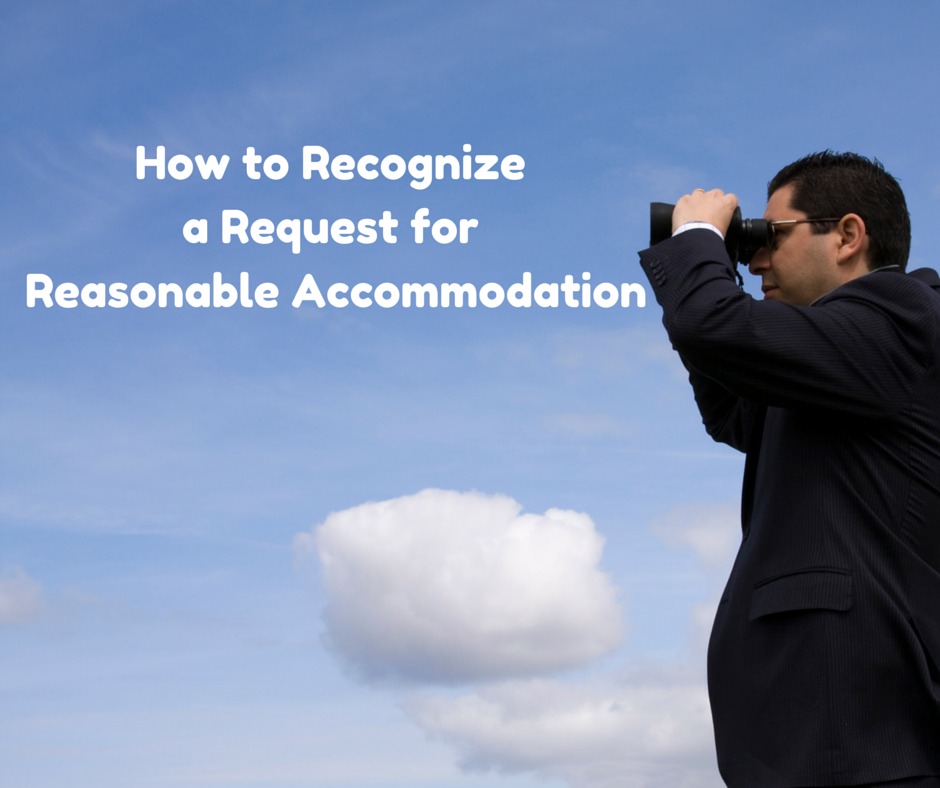One of the first three steps in establishing a responsive reasonable accommodation process is to train front line supervisors and managers to recognize that an employee is making a valid accommodation request. The company’s legal responsibility, and ability to positively retain a valued employee, begins when the request is made.
Understanding that a request has been made can be tricky. There are no magic words that  an employee must say in order to request an accommodation. The words “accommodation” or “reasonable” need not be included in the conversation. Often the request is communicated by a phone call from a spouse or caregiver. Each of these situations may be the trigger for a valid request for accommodation.
an employee must say in order to request an accommodation. The words “accommodation” or “reasonable” need not be included in the conversation. Often the request is communicated by a phone call from a spouse or caregiver. Each of these situations may be the trigger for a valid request for accommodation.
Here are a few tips to teach your management staff so they can recognize that an employee is requesting a reasonable accommodation:
- Is the employee talking about some type of medical condition that is impacting his or her work?
- Has the employee mentioned some sort of physical/intellectual/psychiatric challenge that is impacting his or her work?
- Is the person requesting an adjustment or change to the workplace?
- Has the employee openly disclosed a disability or medical condition?
- Has the employee stated that he or she needs assistance performing a job function?
- Has the employee’s family member, friend, coworker, or health professional requested an accommodation on behalf of the person who is known to have a disability?
Here are some examples of conversations that may signal a request for an accommodation:
- An employee tells her supervisor, “I’m having trouble getting to work at my scheduled starting time because of medical treatments I’m undergoing.” This is a request for a reasonable accommodation.
- An employee tells his supervisor, “I need six weeks off to get treatment for a back problem.” This is a request for a reasonable accommodation.
- A new employee, who uses a wheelchair, informs the employer that her wheelchair cannot fit under the desk in her office. This is a request for reasonable accommodation.
These examples do not represent valid requests for accommodation:
- An employee tells his supervisor that he would like a new chair because his present one is uncomfortable. Although this is a request for a change at work, his statement is insufficient to put the employer on notice that he is requesting a reasonable accommodation because he does not link his need for the new chair with a medical condition or other type of disability.
- An employee observes that another worker has received a sit-stand workstation. Although the first employee’s job includes an essential function that requires prolonged desk-height work, the essential functions of the requesting employee’s job do not include prolonged desk-height work.
This is not a valid request for a reasonable accommodation because no disability-relevant issue was raised by the employee. Further, the purpose for providing an accommodation is to facilitate the safe and effective execution of the essential functions of the requestor’s job; his job does not have an essential function tied to sitting and standing.
When training supervisors and managers to carry out their responsibilities under Title I, be sure to stress to them that they need to avoid asking medical or disability questions about the worker or his family. Here are two tips on questions a manager can ask himself:
- Have you avoided asking for medical details (such as medications, the presence of disabilities, the outlook for a medical condition, etc.) beyond those which are strictly necessary to evaluate the effectiveness of the reasonable accommodation? In reality, a line supervisor should never ask medical or disability related questions as they do not have the authority to medically qualify an individual for granting an accommodation.
- Have you avoided sharing information about the employee’s disability with those who do not absolutely need to know in order to provide the accommodation?
And finally, absent company training, many employees will have little or no knowledge of Title I of the amended Americans with Disabilities Act (ADA). Some may not understand that the medical condition they’re struggling with is a disability! It is the supervisor’s responsibility to actively listen for a communication that signals the need for an accommodation. It is their job to lower barriers to the effective accommodation of those who are qualified under the law.



